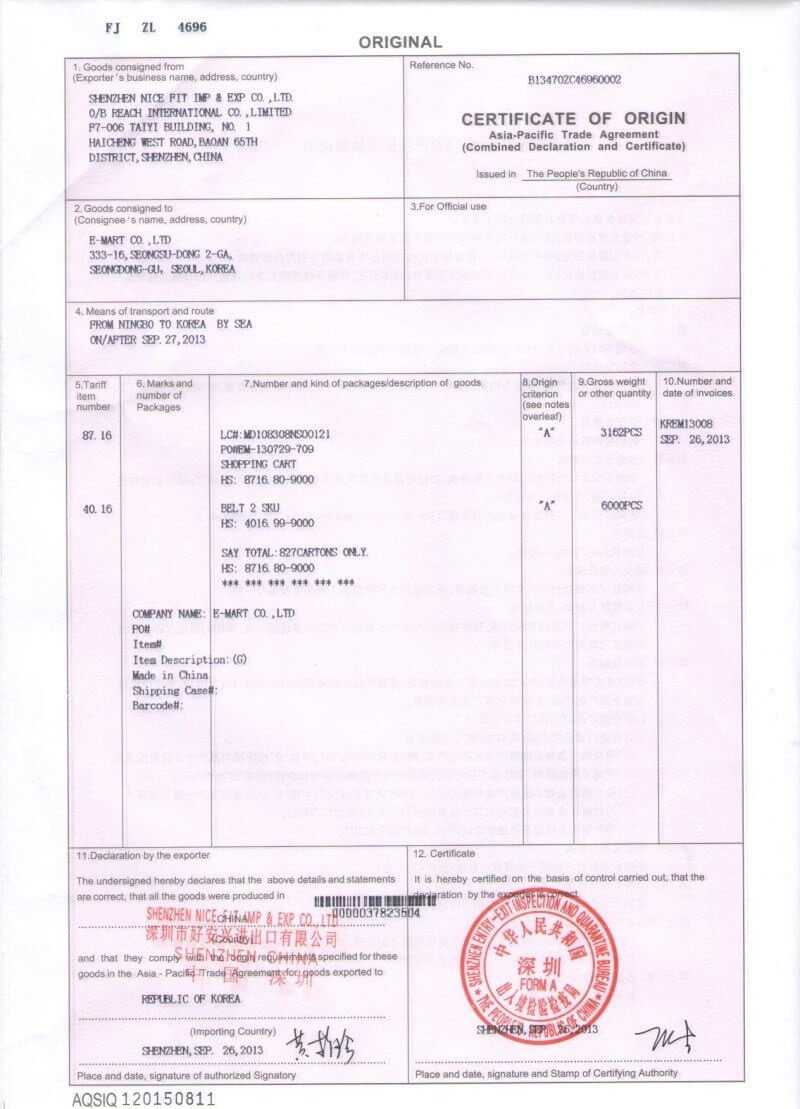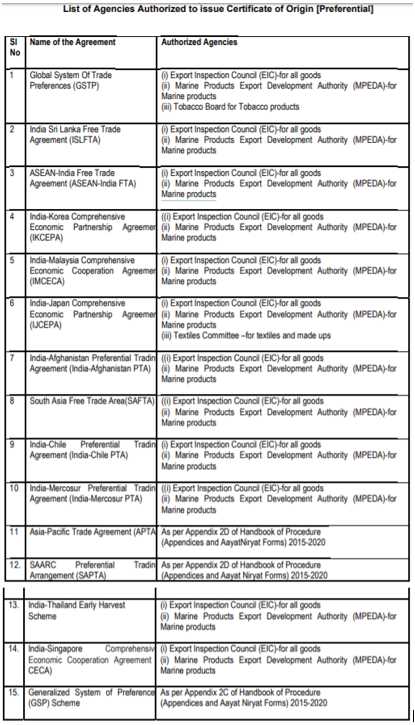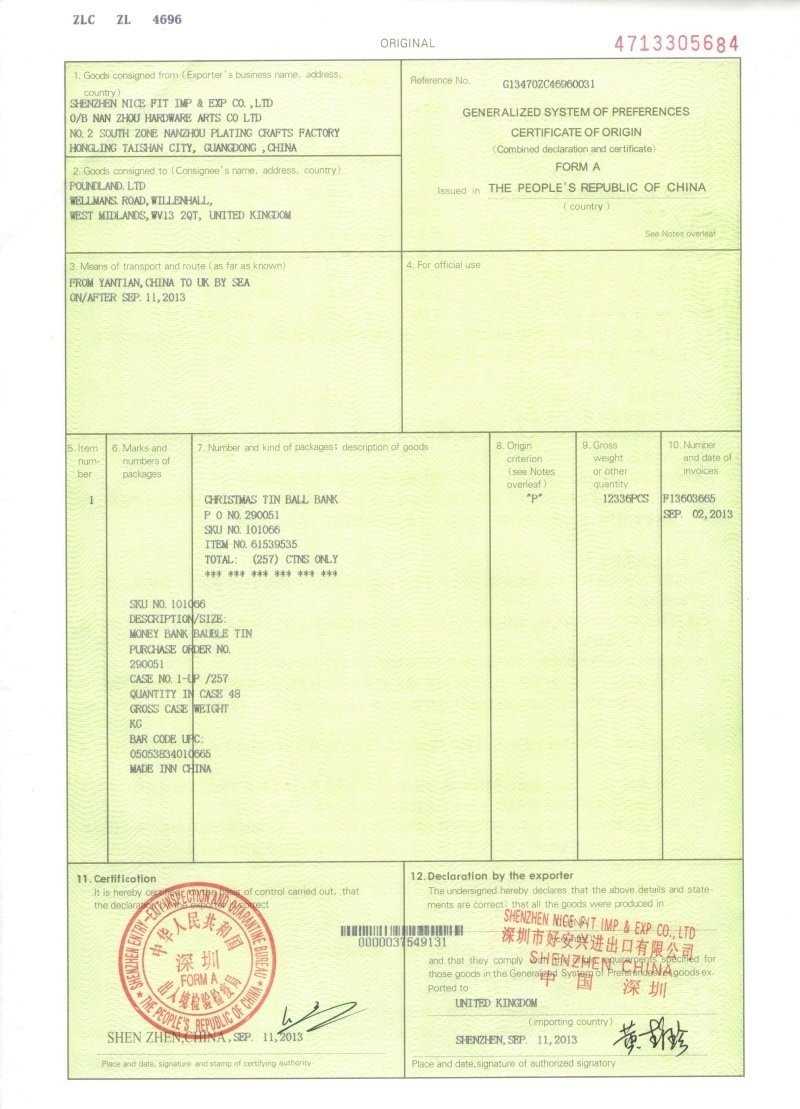Certificate of Origin CO Definition
A Certificate of Origin (CO) is an important document used in international trade to certify the country of origin of goods. It provides information about the place where the goods were produced, manufactured, or processed. The CO is typically issued by the exporter or the manufacturer and is required by customs authorities in the importing country to determine the eligibility for preferential treatment, such as reduced tariffs or duty-free access.
Types of Certificate of Origin

There are several types of Certificate of Origin, including:
- Ordinary Certificate of Origin: This type of CO is used for goods that are produced and exported from a specific country without any preferential treatment.
- Preferential Certificate of Origin: This type of CO is used for goods that are eligible for preferential treatment under a trade agreement or a regional economic integration scheme.
- Non-Preferential Certificate of Origin: This type of CO is used for goods that do not qualify for any preferential treatment and are subject to regular customs duties.
How to Obtain a Certificate of Origin
To obtain a Certificate of Origin, the exporter or the manufacturer needs to follow certain procedures:
- Submit the required documents, such as commercial invoice, packing list, and bill of lading, to the issuing authority.
- Provide accurate information about the origin of the goods, including the country of origin, the manufacturing process, and the materials used.
- Pay the necessary fees for the issuance of the CO.
- Wait for the issuing authority to review the documents and verify the information provided.
- Once approved, the Certificate of Origin will be issued and can be used for customs clearance purposes.
Note: The specific requirements and procedures for obtaining a Certificate of Origin may vary depending on the country and the trade agreement in place.
It is important for exporters and manufacturers to understand the rules and regulations regarding the issuance of COs to ensure compliance with international trade laws and to take advantage of any available preferential treatment.
What is a Certificate of Origin?
A Certificate of Origin (CO) is an official document that certifies the country of origin of a product. It is a crucial document in international trade, as it provides information about the origin of goods and helps determine the eligibility for preferential treatment under trade agreements.
The Certificate of Origin serves as proof that the goods being exported are produced, manufactured, or processed in a particular country. It is often required by customs authorities to determine the correct tariff rates, enforce trade restrictions, and prevent fraud.
Importance of Certificate of Origin
The Certificate of Origin plays a vital role in international trade for several reasons:
- Tariff Determination: Customs authorities use the Certificate of Origin to determine the correct tariff rates for imported goods. Different countries have different tariff rates based on the country of origin, and the CO helps ensure that the correct rates are applied.
- Trade Agreements: Many countries have trade agreements in place that offer preferential treatment to goods originating from specific countries. The CO helps determine the eligibility for such preferential treatment, such as lower or zero tariffs.
- Trade Statistics: The CO provides valuable data for trade statistics, allowing governments and organizations to analyze and monitor international trade patterns.
- Anti-Dumping Measures: The CO helps prevent the circumvention of anti-dumping measures. Anti-dumping duties are imposed on goods that are sold at a lower price in the importing country compared to their normal value, causing harm to domestic industries.
- Preventing Fraud: The CO includes detailed information about the goods, their origin, and the exporter. This helps prevent fraud, such as misrepresentation of the country of origin or false claims of preferential treatment.
Overall, the Certificate of Origin is a crucial document that ensures transparency, accuracy, and compliance in international trade. It helps facilitate smooth customs clearance, promotes fair trade practices, and protects the interests of both importers and exporters.
Types of Certificate of Origin
A Certificate of Origin (CO) is an important document that certifies the country of origin of goods being exported. There are several types of Certificate of Origin, each serving a different purpose:
1. Ordinary Certificate of Origin:
This is the most common type of CO and is used for goods that are not subject to any preferential treatment or trade agreements. It simply certifies the country of origin of the goods.
2. Preferential Certificate of Origin:
This type of CO is used for goods that are eligible for preferential treatment under a trade agreement or a preferential trade arrangement. It certifies that the goods meet the specific origin criteria outlined in the agreement.
3. Non-Preferential Certificate of Origin:
This CO is used for goods that are not eligible for preferential treatment but still require a CO for customs clearance purposes. It certifies the country of origin of the goods but does not provide any preferential treatment.
4. Manufacturer’s Certificate of Origin:
This type of CO is issued by the manufacturer of the goods and certifies that the goods were produced or manufactured in a specific country. It is often required for certain industries or products.
5. Certification of Origin for Exporting Goods:
This CO is used for goods that are being exported to a specific country and need to comply with the import regulations of that country. It certifies that the goods meet the specific requirements set by the importing country.
6. Certification of Origin for Importing Goods:
This CO is used for goods that are being imported into a specific country and need to comply with the import regulations of that country. It certifies that the goods meet the specific requirements set by the importing country.
It is important to determine the correct type of Certificate of Origin required for your goods to ensure smooth customs clearance and compliance with trade agreements or import regulations.
How to Obtain a Certificate of Origin

Obtaining a Certificate of Origin is an important step for businesses involved in international trade. This document serves as proof that the goods being exported have been produced, manufactured, or processed in a specific country.
Here are the steps to obtain a Certificate of Origin:
- Contact the Chamber of Commerce: The first step is to get in touch with your local Chamber of Commerce or any other authorized organization that issues Certificates of Origin. They will provide you with the necessary information and guidance on the application process.
- Complete the Application Form: Once you have identified the appropriate authority, you will need to fill out an application form. This form will require details about the exporter, importer, product description, quantity, value, and other relevant information.
- Provide Supporting Documents: Along with the application form, you will need to submit supporting documents such as invoices, bills of lading, packing lists, and any other documents that prove the origin of the goods.
- Pay the Fees: There is usually a fee associated with obtaining a Certificate of Origin. The amount may vary depending on the issuing authority and the number of copies required.
- Submit the Application: Once you have completed the application form and gathered all the necessary documents, you can submit them to the Chamber of Commerce or the designated authority. They will review your application and verify the information provided.
- Receive the Certificate: If your application is approved, you will receive the Certificate of Origin. It is important to note that the certificate may be issued in either electronic or physical form, depending on the requirements of the importing country.
- Use the Certificate for Customs Clearance: The Certificate of Origin is a crucial document for customs clearance. It should be presented to the customs authorities of the importing country to prove the origin of the goods and benefit from any preferential trade agreements or tariff reductions.
It is important to follow the specific requirements and guidelines provided by the issuing authority to ensure a smooth and successful application process. Failure to comply with the regulations may result in delays or rejection of the Certificate of Origin.
By obtaining a Certificate of Origin, businesses can demonstrate the authenticity and quality of their products, gain access to preferential trade agreements, and build trust with their international partners. It is an essential document for smooth international trade transactions.
Benefits of Having a Certificate of Origin

A Certificate of Origin (CO) is a document that certifies the country of origin of a particular product. It provides important information about the manufacturing or production process of the product and is often required by customs authorities in international trade.
1. Facilitates Customs Clearance
One of the main benefits of having a Certificate of Origin is that it facilitates customs clearance. Customs authorities use this document to verify the origin of the goods and ensure that they comply with the regulations and requirements of the importing country. Without a valid CO, the goods may be subject to delays or even rejection at the border.
2. Qualifies for Preferential Tariffs
Another advantage of having a Certificate of Origin is that it allows the exporter to qualify for preferential tariffs. Many countries have trade agreements in place that offer reduced or zero tariffs for products originating from certain countries. By providing a valid CO, exporters can take advantage of these preferential tariffs and make their products more competitive in the international market.
3. Builds Trust and Credibility
A Certificate of Origin also helps to build trust and credibility between the exporter and the importer. It serves as a proof that the goods are indeed produced in the stated country and meet the required standards. Importers often rely on the CO to ensure the authenticity and quality of the products they are purchasing. Having a valid CO can enhance the reputation of the exporter and increase the likelihood of successful business transactions.
Overall, having a Certificate of Origin is essential for exporters engaged in international trade. It not only facilitates customs clearance and qualifies for preferential tariffs, but also builds trust and credibility in the global market.
International Markets and Certificate of Origin
The Certificate of Origin provides proof that the goods being exported were produced, manufactured, or processed in a specific country. It helps to prevent fraud and ensures that the goods meet the necessary quality and safety standards of the importing country.
International markets place great importance on the Certificate of Origin as it provides transparency and authenticity to the origin of the goods. It helps buyers and consumers make informed decisions about the products they purchase. Additionally, it allows governments to monitor and regulate trade activities, ensuring fair competition and protecting domestic industries.
Obtaining a Certificate of Origin is a relatively straightforward process. The exporter or the manufacturer of the goods needs to apply for the certificate from the relevant authority or chamber of commerce in their country. The application usually requires providing detailed information about the goods, including their description, value, quantity, and origin.
The benefits of having a Certificate of Origin are numerous. It allows exporters to take advantage of preferential trade agreements, which can result in lower tariffs or duty-free access to certain markets. It also helps to build trust and credibility with buyers, as it demonstrates compliance with international trade regulations and standards.
Furthermore, the Certificate of Origin simplifies the customs clearance process, reducing delays and potential penalties. It provides customs officials with the necessary information to determine the correct classification and valuation of the goods, ensuring smooth and efficient trade operations.

Emily Bibb simplifies finance through bestselling books and articles, bridging complex concepts for everyday understanding. Engaging audiences via social media, she shares insights for financial success. Active in seminars and philanthropy, Bibb aims to create a more financially informed society, driven by her passion for empowering others.
